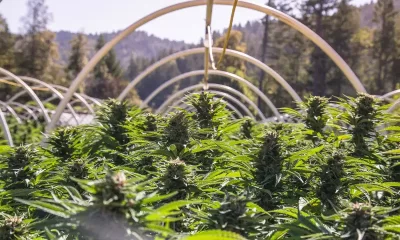Business
Colorado Gov. Announces 16 Recipients of Cannabis Business Grant

The Colorado grant program is designed “to save small businesses money, foster equity and diversity in the cannabis industry, and create good-paying jobs for Coloradans.”
Colorado Gov. Jared Polis last week announced the first businesses to receive funding through the state’s Cannabis Business Pilot Grant.
A total of 16 aspiring cannabis retailers received the grants through a program that seeks “to save small businesses money, foster equity and diversity in the cannabis industry, and create good-paying jobs for Coloradans.”
“Our nation-leading work promoting equity and supporting innovation in Colorado’s thriving cannabis industry supports our economy, saves small businesses money, and ensures our state remains the best business-friendly destination in the country,” Polis, a Democrat, said in a statement on Thursday. “I’m proud to see this multi-year effort result in transformative grants to deserving applicants.”
The pilot grant program is part of a concerted effort to ensure that the state-regulated cannabis market benefits individuals from communities that have been disproportionately affected by the War on Drugs.
In addition to facilitating economic opportunities through its new marijuana law, Colorado, like other states, have also offered a pathway for previous pot-related offenders to clean their record.
In January, Polis rang in the new year with an executive order that granted pardons to more than 1,300 individuals who had been convicted of possession of two ounces or less of cannabis.
The executive order was a byproduct of a bill signed into law by Polis that “authorized the Governor to grant pardons to a class of defendants who were convicted of the possession of up to two ounces of marijuana,” according to Polis’s office.
“Adults can legally possess marijuana in Colorado, just as they can beer or wine. It’s unfair that 1,351 additional Coloradans had permanent blemishes on their record that interfered with employment, credit, and gun ownership, but today we have fixed that by pardoning their possession of small amounts of marijuana that occurred during the failed prohibition era,” Polis said in a statement at the time.
The grants awarded by the Polis administration last week are described as “a funding opportunity for social equity cannabis businesses who have been awarded, or are actively pursuing, a regulated business license from the Marijuana Enforcement Division,” according to the state, which said the program “was developed to support cannabis entrepreneurs through access to capital to promote social equity, innovation, and job creation across the industry.”
Recipients of the grants may receive a maximum of $25,000 or $50,000.
The program is administered by the state’s Cannabis Business Office, which “provided grant applicants with educational and professional development opportunities as a part of the grant-making process,” according to a press release from the governor’s office.
The press release said that applicants “were required to complete a business development curriculum and create business plans and project proposals,” which included online learning modules.
Under the terms of the program, if the applicant did not include the training by the time the application was submitted, they were then given “21 calendar days to complete the technical assistance or forfeit their grant application submission and potential grant award.”
“The grant process was designed to ultimately prepare applicants with the foundational knowledge and materials for future success, as well as equip those in Colorado’s Cannabis Industry with a robust skillset to continue our state’s leadership in the space,” the press release said.
The 16 businesses selected to receive the first round of grant funding are: Apollo Limited; Canna-Couriers; Colorado Kush; Cb1 Logistics; Delta-9; Different Strokes 2.0 Puff N Paint Sip Art Studio; Flora Cannabis; Go Harvest LLC; Grn Bus; IDY Packaging Distributors; Kaylx Brands; Meta-Zon CannClub; Mile High Lounge (Ganja Games); Paly; Pufflow.com; and Tetra Hospitality Group.
Source: https://hightimes.com/news/colorado-gov-announces-16-recipients-of-cannabis-business-grant/
Business
New Mexico cannabis operator fined, loses license for alleged BioTrack fraud

New Mexico regulators fined a cannabis operator nearly $300,000 and revoked its license after the company allegedly created fake reports in the state’s traceability software.
The New Mexico Cannabis Control Division (CCD) accused marijuana manufacturer and retailer Golden Roots of 11 violations, according to Albuquerque Business First.
Golden Roots operates the The Cannabis Revolution Dispensary.
The majority of the violations are related to the Albuquerque company’s improper use of BioTrack, which has been New Mexico’s track-and-trace vendor since 2015.
The CCD alleges Golden Roots reported marijuana production only two months after it had received its vertically integrated license, according to Albuquerque Business First.
Because cannabis takes longer than two months to be cultivated, the CCD was suspicious of the report.
After inspecting the company’s premises, the CCD alleged Golden Roots reported cultivation, transportation and sales in BioTrack but wasn’t able to provide officers who inspected the site evidence that the operator was cultivating cannabis.
In April, the CCD revoked Golden Roots’ license and issued a $10,000 fine, according to the news outlet.
The company requested a hearing, which the regulator scheduled for Sept. 1.
At the hearing, the CCD testified that the company’s dried-cannabis weights in BioTrack were suspicious because they didn’t seem to accurately reflect how much weight marijuana loses as it dries.
Company employees also poorly accounted for why they were making adjustments in the system of up to 24 pounds of cannabis, making comments such as “bad” or “mistake” in the software, Albuquerque Business First reported.
Golden Roots was fined $298,972.05 – the amount regulators allege the company made selling products that weren’t properly accounted for in BioTrack.
The CCD has been cracking down on cannabis operators accused of selling products procured from out-of-state or not grown legally:
- Regulators alleged in August that Albuquerque dispensary Sawmill Sweet Leaf sold out-of-state products and didn’t have a license for extraction.
- Paradise Exotics Distro lost its license in July after regulators alleged the company sold products made in California.
Golden Roots was the first alleged rulebreaker in New Mexico to be asked to pay a large fine.
Source: https://mjbizdaily.com/new-mexico-cannabis-operator-fined-loses-license-for-alleged-biotrack-fraud/
Business
Marijuana companies suing US attorney general in federal prohibition challenge

Four marijuana companies, including a multistate operator, have filed a lawsuit against U.S. Attorney General Merrick Garland in which they allege the federal MJ prohibition under the Controlled Substances Act is no longer constitutional.
According to the complaint, filed Thursday in U.S. District Court in Massachusetts, retailer Canna Provisions, Treevit delivery service CEO Gyasi Sellers, cultivator Wiseacre Farm and MSO Verano Holdings Corp. are all harmed by “the federal government’s unconstitutional ban on cultivating, manufacturing, distributing, or possessing intrastate marijuana.”
Verano is headquartered in Chicago but has operations in Massachusetts; the other three operators are based in Massachusetts.
The lawsuit seeks a ruling that the “Controlled Substances Act is unconstitutional as applied to the intrastate cultivation, manufacture, possession, and distribution of marijuana pursuant to state law.”
The companies want the case to go before the U.S. Supreme Court.
They hired prominent law firm Boies Schiller Flexner to represent them.
The New York-based firm’s principal is David Boies, whose former clients include Microsoft, former presidential candidate Al Gore and Elizabeth Holmes’ disgraced startup Theranos.
Similar challenges to the federal Controlled Substances Act (CSA) have failed.
One such challenge led to a landmark Supreme Court decision in 2005.
In Gonzalez vs. Raich, the highest court in the United States ruled in a 6-3 decision that the commerce clause of the U.S. Constitution gave Congress the power to outlaw marijuana federally, even though state laws allow the cultivation and sale of cannabis.
In the 18 years since that ruling, 23 states and the District of Columbia have legalized adult-use marijuana and the federal government has allowed a multibillion-dollar cannabis industry to thrive.
Since both Congress and the U.S. Department of Justice, currently headed by Garland, have declined to intervene in state-licensed marijuana markets, the key facts that led to the Supreme Court’s 2005 ruling “no longer apply,” Boies said in a statement Thursday.
“The Supreme Court has since made clear that the federal government lacks the authority to regulate purely intrastate commerce,” Boies said.
“Moreover, the facts on which those precedents are based are no longer true.”
Verano President Darren Weiss said in a statement the company is “prepared to bring this case all the way to the Supreme Court in order to align federal law with how Congress has acted for years.”
While the Biden administration’s push to reschedule marijuana would help solve marijuana operators’ federal tax woes, neither rescheduling nor modest Congressional reforms such as the SAFER Banking Act “solve the fundamental issue,” Weiss added.
“The application of the CSA to lawful state-run cannabis business is an unconstitutional overreach on state sovereignty that has led to decades of harm, failed businesses, lost jobs, and unsafe working conditions.”
Business
Alabama to make another attempt Dec. 1 to award medical cannabis licenses

Alabama regulators are targeting Dec. 1 to award the first batch of medical cannabis business licenses after the agency’s first two attempts were scrapped because of scoring errors and litigation.
The first licenses will be awarded to individual cultivators, delivery providers, processors, dispensaries and state testing labs, according to the Alabama Medical Cannabis Commission (AMCC).
Then, on Dec. 12, the AMCC will award licenses for vertically integrated operations, a designation set primarily for multistate operators.
Licenses are expected to be handed out 28 days after they have been awarded, so MMJ production could begin in early January, according to the Alabama Daily News.
That means MMJ products could be available for patients around early March, an AMCC spokesperson told the media outlet.
Regulators initially awarded 21 business licenses in June, only to void them after applicants alleged inconsistencies with how the applications were scored.
Then, in August, the state awarded 24 different licenses – 19 went to June recipients – only to reverse themselves again and scratch those licenses after spurned applicants filed lawsuits.
A state judge dismissed a lawsuit filed by Chicago-based MSO Verano Holdings Corp., but another lawsuit is pending.
Source: https://mjbizdaily.com/alabama-plans-to-award-medical-cannabis-licenses-dec-1/
-

 Business2 years ago
Business2 years agoPot Odor Does Not Justify Probable Cause for Vehicle Searches, Minnesota Court Affirms
-

 Business2 years ago
Business2 years agoNew Mexico cannabis operator fined, loses license for alleged BioTrack fraud
-

 Business2 years ago
Business2 years agoAlabama to make another attempt Dec. 1 to award medical cannabis licenses
-

 Business2 years ago
Business2 years agoWashington State Pays Out $9.4 Million in Refunds Relating to Drug Convictions
-

 Business2 years ago
Business2 years agoMarijuana companies suing US attorney general in federal prohibition challenge
-

 Business2 years ago
Business2 years agoLegal Marijuana Handed A Nothing Burger From NY State
-

 Business2 years ago
Business2 years agoCan Cannabis Help Seasonal Depression
-

 Blogs2 years ago
Blogs2 years agoCannabis Art Is Flourishing On Etsy













